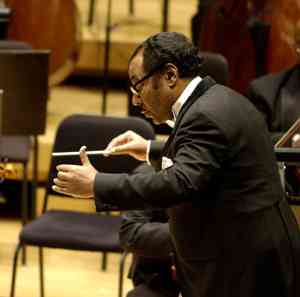Home
Blog
Composers
Musicians
Black History
Audio
About Us
Links
Musicians:
Blanke, John
Bridgetower, George A. P.
Chapman Nyaho, William H.
DePreist, James
Dworkin, Aaron Paul
Freeman, Paul
Johnson, Francis
Machado, Celso
Ngwenyama, Nokuthula
Wiggins, Thomas "Blind Tom"
Yifrashewa, Girma
AfriClassical Blog
Companion to AfriClassical.com
Guest Book
William J. Zick, Webmaster,
wzick@ameritech.net
©
Copyright 2006 - 2022
William J. Zick
All rights reserved for all content of AfriClassical.com
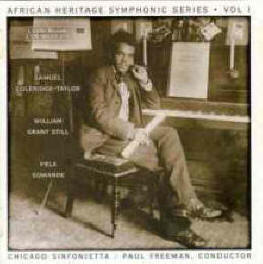
African Heritage
Symphonic Series Vol. I
Cover: Samuel Coleridge-Taylor
Cedille 90000 055 (2000)
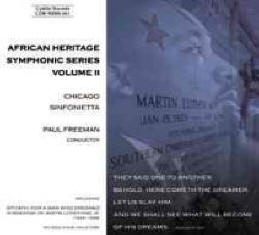
African Heritage
Symphonic Series, Vol. II
Cedille 90000 061 (2001)
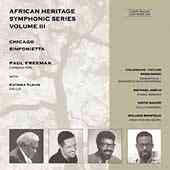
African
Heritage Symphonic Series, Vol. III
Cedille 90000 066 (2003)
Photos Courtesy of Chicago Sinfonietta
|
Home
-> Musicians -> Freeman, Paul
Français
Paul Freeman (1936 - 2015)
African American Conductor
Founder of Chicago Sinfonietta
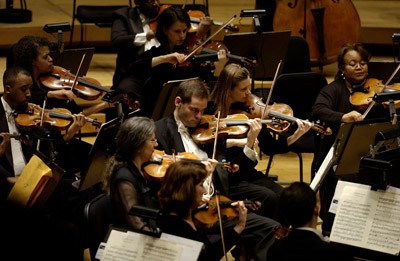
Chicago
Sinfonietta String Players
Audio Sample: Cedille 90000 055 (2000);
African Heritage Symphonic Series, Vol. I; Fela Sowande; African Suite
I.
Joyful Day
1 Music
Studies
Paul Freeman was born in Richmond, Virginia January 2, 1936 and grew up there. He studied both
clarinet and cello, then earned a Ph.D. at the Eastman School of Music. A
Fulbright Grant enabled him to continue his studies in Berlin. Maestro Freeman passed away on July 22nd, 2015. See blog post here.
2
Conductor
Maestro Freeman founded the Chicago Sinfonietta in 1987 to achieve, in the words of its mission, "Musical
Excellence Through Diversity". He served as Music Director from
its founding through the 2010-2011 Season. Paul Freeman was
succeeded by Sinfonietta Music Director Mei-Ann Chen The website of the Sinfonietta describes the other positions Paul
Freeman has held:
|
In 1996, he was appointed music director and
chief conductor of the Czech National
Symphony Orchestra in Prague, a position he holds simultaneously with his Chicago Sinfonietta post. From 1979 to 1989, he
served as music director of the Victoria
Symphony in Canada, principal guest
conductor of the Helsinki Philharmonic in
Finland, associate conductor of the Dallas and
Detroit Symphony Orchestras, and music
director of the Opera Theatre of Rochester,
New York.
A recipient of the Mahler Award for the
European Union of Arts, Freeman is in
constant demand as a guest conductor, having
led more than 100 orchestras in over 30
countries. As one of America's most
successful recording conductors, he has
approximately 200 releases to his credit. His
nine-LP series tracing the history of Black
symphonic composers from 1750 to the
present garnered a great deal of attention on
the Columbia label in the mid-1970s.
|
3 Chicago
Sinfonietta
On January 25, 2005 the Detroit Free Press published a story by music
writer Mark Stryker entitled: A BLACK KEY: Conductor Paul Freeman, in town
for the Sphinx Competition, adds color to the national classical music
scene. Stryker begins with these observations about the Sinfonietta:
|
Black and Latino musicians account for about
3 percent of the musicians in American
orchestras but about 30 percent of the Chicago
Sinfonietta.
Most orchestras have practically all-white
boards of directors and audiences, but about a
third of the Sinfonietta's board is non-white and
about 40 percent of its audience is minority.
Most orchestras rarely play music by minority
composers, but the Sinfonietta integrates
these works throughout its entire season.
|
4 Diversity At All Levels
Mark Stryker reports that the Chicago Sinfonietta is characterized by
diversity in all aspects of its operations:
|
When it
comes to diversity, this is an orchestra doing a lot of
things right. It should come as no surprise that its
driving force is founding music director Paul Freeman,
the widely-traveled African-American conductor who
spearheaded a landmark series of black composer
recordings for Columbia in the 1970s when he was
resident conductor of the Detroit Symphony Orchestra.
"It's a total committment," says Freeman, 69. "Often an
attempt is made to integrate one or two areas of an
orchestra's programs, but we do it at all levels - on
stage, soloists, repertoire, the board and audiences. |
5
Concerts & Tours
Mark Stryker goes on to describe the makeup of the Sinfonietta, and its
budget, tours and recordings:
|
With a $2 million annual budget, the Sinfonietta
employs professional freelance musicians and
performs a subscription series of five concerts
performed in pairs at Orchestra Hall downtown
and at Dominican University in suburban River
Forest. Most unusual for an orchestra of its
size, the Sinfonietta has toured overseas five
times and made a dozen recordings, including
an African Heritage Symphonic Series for
Cedille Records devoted to black composers. |
6 Musicians
The Detroit Free Press article describes the process by which the Chicago Sinfonietta selects the freelance musicians who make up the ensemble:
|
Freeman has called the Sinfonietta an affirmative action orchestra with no quotas and
no numbers. He only selects players for the
orchestra who meet the highest performance standards, and no one is displaced to make
room for a minority player. But the orchestra
keeps an extensive list of substitutes who are
black or Hispanic. When an opening comes
up, preference is given to a qualified player on
the list. |
7
African Heritage Series
As noted above, Paul Freeman and the Chicago Sinfonietta have completed
their African Heritage Symphonic Series in three volumes. Many of the
composers have their own pages at this Web site:
Vol. 1. Cedille 90000 055 (2000):
Samuel Coleridge-Taylor (1875-1912), Danse Nègre From African Suite (6:14)
Fela Sowande (1905-1987), African Suite (Selections) 10:02;
William Grant Still (1895-1978), Symphony No. 1 (Afro-American) (21:10).
Vol. 2. Cedille 90000 061 (2001):
Ulysses Kay (1917-1995), Overture to Theater Set (4:28)
George Walker (b. 1922), Lyric for Strings (5:17)
Roque Cordero (1917-2008), Eight Miniatures for Small Orchestra (11:47)
Adolphus Hailstork (b. 1941), An American Port of Call (8:32),
Epitaph for
a Man who Dreamed (7:37),
Hale Smith (1925-2009) Ritual and Incantations (12:45)
Vol. 3. Cedille 90000 066 (2003):
Michael Abels (b. 1962), Global Warming (8:18)
David Baker (b. 1931), Cello Concerto (19:56)
William Banfield (b. 1961), Essay for Orchestra (10:33);
Coleridge-Taylor Perkinson (1932-2004) Generations: Sinfonietta No. 2 for
Strings (19:20).
8 David Nathaniel
Baker
Paul Freeman Introduces David Baker is Albany Records Troy
843 (2006). The soloists are Jiri Novotny, trombone, and Thomas
Walsh, saxophone. Maestro Freeman conducts the Czech National
Symphony Orchestra. The CD is Volume 12 of a Paul Freeman series
devoted to new orchestral music. The Albany Records Website says:
|
Throughout this series he has presented
several works by the outstanding African-American composer David Nathaniel Baker
(a previous all-Baker disc is on TROY 377).
A native of Indianapolis, Baker holds the
position of Distinguished Professor of Music
and Chairman of the Jazz Department at the
Indiana University School of Music. |
ClassicsToday.com has published a review by David Hurwitz which rates
both the performance and the sound of the disc as 9 of a possible 10.
It opens with favorable comments on Kosbro (Keep on steppin' brothers!)
and Fantasy on Themes from Masque of the Red Death Ballet.
The review then discusses Concert Piece for Trombone and String
Orchestra and Concerto for Alto Saxophone and Orchestra:
|
The
best pieces, though, are the two concertos, both of
which deserve to be in the repertoire of every
self-respecting trombonist or sax player.
...
Paul Freeman has the Czech National Symphony playing
with the necessary panache and rhythmic snap, and the
engineering also is very good: warm and well-balanced. |
This page was last updated on
March 5, 2022 |




